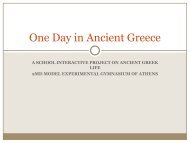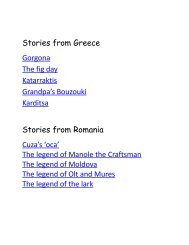Easter in Greece
You also want an ePaper? Increase the reach of your titles
YUMPU automatically turns print PDFs into web optimized ePapers that Google loves.
EASTER IN GREECE<br />
2 nd Model Experimental school of Athens
<strong>Easter</strong> <strong>in</strong> <strong>Greece</strong><br />
<strong>Easter</strong> <strong>in</strong> <strong>Greece</strong> is a very important holiday.<br />
The Greek Orthodox Church plays a large role<br />
<strong>in</strong> the Greek <strong>Easter</strong> ' Pascha' celebrations.
Greek <strong>Easter</strong> Food<br />
Mageiritsa <strong>Easter</strong> Soup<br />
A soup made with boiled lamb offal - liver, heart<br />
and <strong>in</strong>test<strong>in</strong>es, cooked along with onions, dill,<br />
thyme and lemon.<br />
Koulourakia<br />
Sweet <strong>Easter</strong> biscuits<br />
Tsoureki<br />
A braided sweet bread.<br />
Red Eggs<br />
Hard boiled eggs are dyed red to symbolize the<br />
blood of Christ
<strong>Easter</strong> Game with the Red<br />
Eggs<br />
A Greek <strong>Easter</strong> tradition is the game<br />
tsougrisma ( knock<strong>in</strong>g eggs together). Two<br />
players take a red egg each. One player holds<br />
their egg <strong>in</strong> a fist while the other player taps<br />
the end of their egg aga<strong>in</strong>st the end of the<br />
other player's egg. The egg which cracks is<br />
the loser. The w<strong>in</strong>n<strong>in</strong>g egg goes on to play<br />
with other players / eggs.<br />
The last player to keep their egg <strong>in</strong>tact is the<br />
w<strong>in</strong>ner who is considered to be lucky.
Greek <strong>Easter</strong> Traditions<br />
There are many traditions <strong>in</strong> <strong>Greece</strong> related to <strong>Easter</strong>. The week lead<strong>in</strong>g<br />
up to <strong>Easter</strong> (Holy Week or Megali Evdomada)plays a major role <strong>in</strong><br />
these.<br />
Throughout Holy Week the churches hold services at least once a day.<br />
Traditionally the people fast and no meat, oil or dairy products are eaten<br />
until midnight on <strong>Easter</strong> Saturday, after the symbolic Resurrection. Some<br />
traditions <strong>in</strong>clude:<br />
bak<strong>in</strong>g <strong>Easter</strong> biscuits "koulourakia' with oil and eggs, to be eaten after the<br />
fast is over ( Holy Tuesday).<br />
f<strong>in</strong>ish<strong>in</strong>g all household chores by Holy Wednesday.<br />
dy<strong>in</strong>g eggs red to symbolise the blood of Christ, and bak<strong>in</strong>g <strong>Easter</strong> bread –<br />
Tsoureki on Holy Thursday.<br />
decorat<strong>in</strong>g the Epitafio - the funeral bier and a service is held for Christ's<br />
funeral. A quiet process<strong>in</strong>g of the Epitaph takes place at dusk on Holy<br />
Friday.<br />
celebrat<strong>in</strong>g Christ’s resurrection on Holy Saturday midnight wish<strong>in</strong>g<br />
‘Christos Anesti’. Light<strong>in</strong>g a candle, eat<strong>in</strong>g mageiritsa and knock<strong>in</strong>g eggs.
‘Kalo Pasha’<br />
roast<strong>in</strong>g lamb on the spit on <strong>Easter</strong> Sunday<br />
wish<strong>in</strong>g ‘Kalo Pasha’ on <strong>Easter</strong> Sunday.









